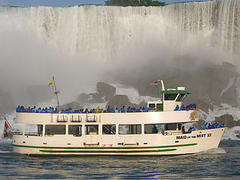4. Can I go on the Maid of the Mist?
Paco has gone on a trip to Niagara falls. They are located in the border between Canada and the United States, and they are only 130 kilometres from Toronto, where Paco has stayed for the last few days. This place is considered to be one of the world's natural wonders.
Both the view and the sound of the water is breathtaking. The best way to enjoy them is going on the Maid of the Mist, a boat than allows you to see the Falls from the river and that will make your trip a unique experience.
The area is full of shops, hotels and restaurants for tourists. Paco went to one of these restaurants to have some lunch and he overheard the following conversation from a family:
 |
|
By Bobcatnorth (away through New Years), C. Commons
|
GIRL: Dad, can I go on the Maid of the Mist please?
FATHER: Yes, you can. We'll go after lunch, ok?
GIRL: Dad, can you read this to me, please? What does it say?
FATHER: Ask your brother, sweetheart. Tom can read too.
The girl was looking forward to going on the boat, and so was Paco. He was lost in his thoughts when the man talked to him:
FATHER: Excuse me, sir, may I take this chair?
PACO: Sure! I'm not using it.
Verdadero Falso
Verdadero Falso
3. Paco wants to try the Maid of the Mist.
Verdadero Falso
Study the following examples from the text:
 |
| By David@UNT, C. Commons |
Dad, can I go on the Maid of the Mist please?
Yes, you can.
Dad, can you read this to me, please?
Tom can read too.
Excuse me, sir, may I take this chair?
1- Do they express ability, permission or request?
2- What is the difference between 'can' and 'may'? Is there another way of expressing permission and request politely?
3- What is the past form of 'can' (both meaning ability and permission)?When you need to express ABILITY in the present, you use CAN; in the past, you use COULD; whenever you need any other tense, use the form BE ABLE TO.
When you need to express PERMISSION in the present, you use CAN; in the past, you use COULD; whenever you need any other tense, use the form BE ALLOWED TO.
Remember there are also other modal verbs, such as WILL or SHALL for the future, or WOULD.Practice modal verbs of ability and permission by doing the exercises below.
| Exercise 1 |
Exercise 2 |
Exercise 3 |
Would you like to have a look at Niagara Falls? Have a look at the images and listen to the information.